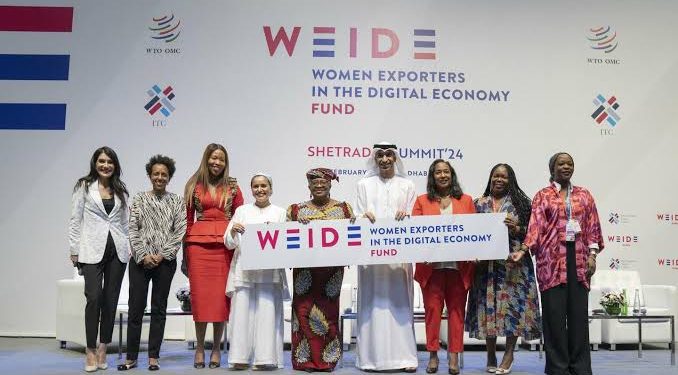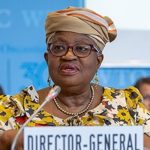Director-General of the World Trade Organization, Dr. Ngozi Okonjo-Iweala, has unveiled a $50 million global fund to empower women entrepreneurs in digital trade, with Nigeria among the first four countries selected for the rollout.
The Women Exporters in the Digital Economy (WEIDE) Fund, a joint initiative of the WTO and the International Trade Centre, is designed to equip women-owned businesses in developing countries with the skills, finance, and networks needed to compete in global value chains.
Speaking in Abuja on Thursday, Okonjo-Iweala described the fund as “more than a program, it is a movement,” aimed at enabling women entrepreneurs to thrive in the rapidly growing digital trade market. She noted that global commerce is facing “extremely challenging times” marked by protectionism and unilateral trade barriers, but also holds unprecedented opportunities in the digital space.
“No nation can truly digitise without steady electricity and reliable, affordable internet,” she warned, pointing out that only 45 per cent of Nigerians are currently online, far below the global average of 67 per cent.
Nigeria was chosen after a highly competitive process involving over 600 business support organisations worldwide, with the Nigerian Export Promotion Council under Mrs. Nonye Ayeni submitting a standout proposal.
Over 67,000 Nigerian women entrepreneurs applied for the first cohort. Originally planned for 100 beneficiaries, the exceptional quality of entries led to 146 women-owned businesses being selected. Sixteen “Booster Track” awardees will each receive up to $30,000 and 18 months of technical assistance, while 130 “Discovery Track” awardees will each get up to $5,000 and one year of business support.
Beneficiaries operate across key MSME sectors including agriculture, ICT, fashion, hospitality, beauty, manufacturing, and agri-processing.
Okonjo-Iweala highlighted that Africa accounts for less than one per cent of global digital trade despite its potential. Digitally delivered services such as IT, consulting, and education have grown from $1 trillion in 2005 to $4.25 trillion today, an area she says Nigerian women can and must take advantage of.
While welcoming Nigeria’s $2 billion fibre optic project to expand internet access, she stressed the need for inter-ministerial collaboration among the ministries of power, communications, women’s affairs, and trade to sustain and scale women’s participation in digital trade.
She also urged policymakers to avoid customs duties on cross-border digital trade, warning that such taxes could choke one of the best pathways for women-led MSMEs to reach global markets.
The WTO DG lamented that only 30 per cent of Nigerian tech firms are owned by women, with Nigeria ranking 128th out of 148 countries in the Global Gender Gap Report. She called women’s empowerment “smart economics” that benefits communities and the economy as a whole.
Addressing the beneficiaries, she said, “You earned this through hard work and vision. Use this moment to dream bigger, scale higher, and go further. When I return in two years, I want to see how many more people you have hired, how many new markets you have reached, and how many women you have inspired.”










